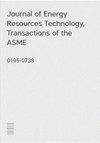Influence of overburden pressure on imbibition behavior in tight sandstones using nuclear magnetic resonance technique
IF 2.4
3区 工程技术
Q3 ENERGY & FUELS
Journal of Energy Resources Technology-transactions of The Asme
Pub Date : 2023-01-23
DOI:10.1115/1.4056728
引用次数: 1
Abstract
Imbibition under overburden pressure can simulate the imbibition behavior in reservoir conditions during hydraulic fracturing, about which the mechanism is still unclear. This study investigated the imbibition with overburden pressure using a nuclear magnetic resonance displacement design. The main contribution of this study is that the initial imbibition rate under confining pressure can reflect the pore connectivity of reservoirs under overburden pressure and a method for appraising the pore connectivity under confining pressure was established. The tight sandstone samples were collected from the Upper Paleozoic Taiyuan and Shihezi Formations in Ordos Basin. The Taiyuan Formation presents apparent double-peak structure from nuclear magnetic resonance (NMR) spectra, and liquid fills into small pore preferentially as a whole. When the imbibition time is on a square root scale, the cumulative imbibition height at the initial imbibition period is not stable, which deviates from the linear principle, and the initial imbibition rate ranges from 0.077 to 0.1145. The Shihezi Formation shows a dominant peak structure from NMR spectra, and the liquid has no obvious filling order as a whole. When the imbibition time is on a square root scale, the cumulative imbibition height at the initial imbibition period also deviates from the linear principle, and the initial imbibition rate ranges from 0.0641 to 0.1619.利用核磁共振技术研究上覆压力对致密砂岩渗吸行为的影响
覆盖层压力下的吸胀可以模拟水力压裂过程中储层条件下的吸渗行为,其机理尚不清楚。本研究采用核磁共振位移设计研究了覆岩压力下的渗吸。本研究的主要贡献在于,围压下的初始吸渗速率可以反映覆压下储层的孔隙连通性,并建立了一种评价围压下孔隙连通性的方法。采集了鄂尔多斯盆地上古生界太原组和石河子组致密砂岩样品。从核磁共振(NMR)谱来看,太原组表现出明显的双峰结构,液体总体上优先填充在小孔中。当自吸时间在平方根尺度上时,初始自吸期的累积自吸高度不稳定,这偏离了线性原理,并且初始自吸速率在0.077到0.1145之间。核磁共振波谱显示石河子组为主峰结构,液体整体上没有明显的填充顺序。当自吸时间在平方根尺度上时,初始自吸期的累积自吸高度也偏离线性原理,初始自吸收速率在0.0641至0.1619之间。
本文章由计算机程序翻译,如有差异,请以英文原文为准。
求助全文
约1分钟内获得全文
求助全文
来源期刊
CiteScore
6.40
自引率
30.00%
发文量
213
审稿时长
4.5 months
期刊介绍:
Specific areas of importance including, but not limited to: Fundamentals of thermodynamics such as energy, entropy and exergy, laws of thermodynamics; Thermoeconomics; Alternative and renewable energy sources; Internal combustion engines; (Geo) thermal energy storage and conversion systems; Fundamental combustion of fuels; Energy resource recovery from biomass and solid wastes; Carbon capture; Land and offshore wells drilling; Production and reservoir engineering;, Economics of energy resource exploitation

 求助内容:
求助内容: 应助结果提醒方式:
应助结果提醒方式:


